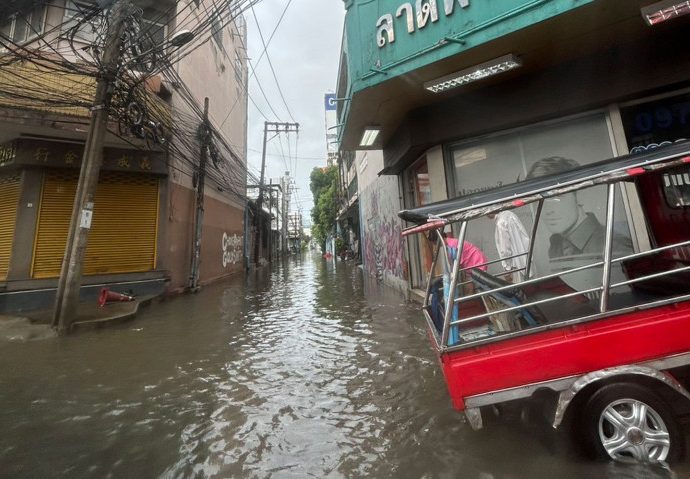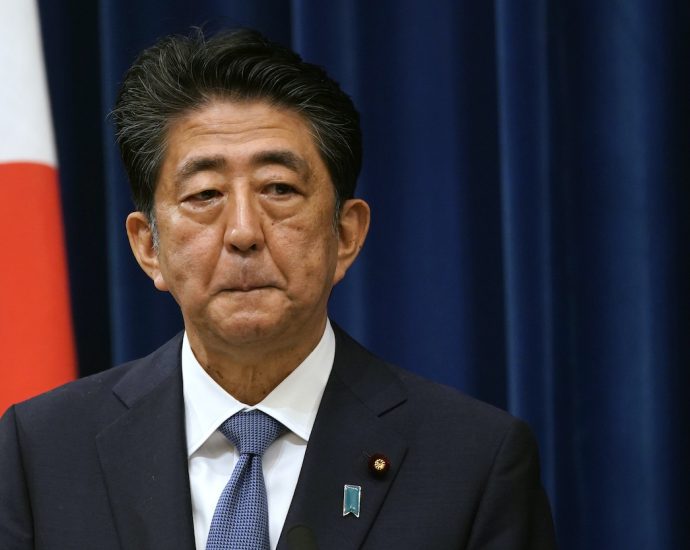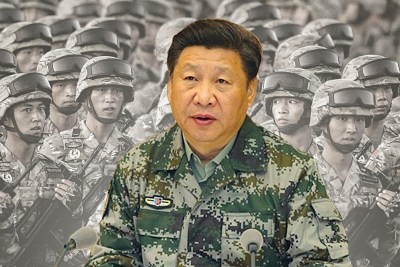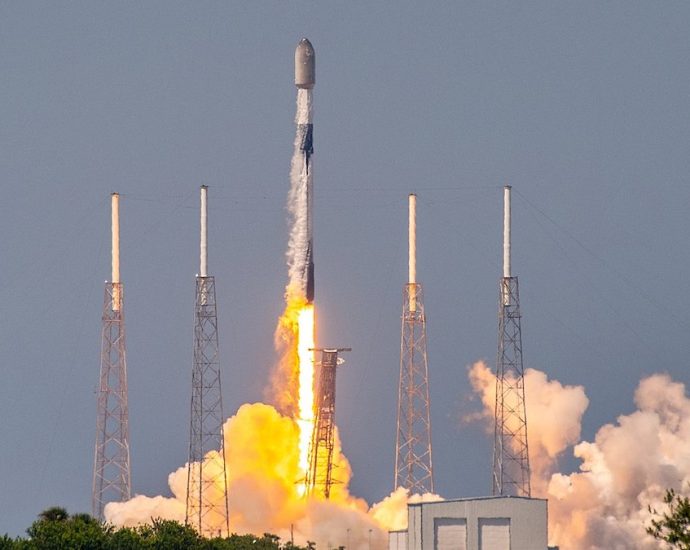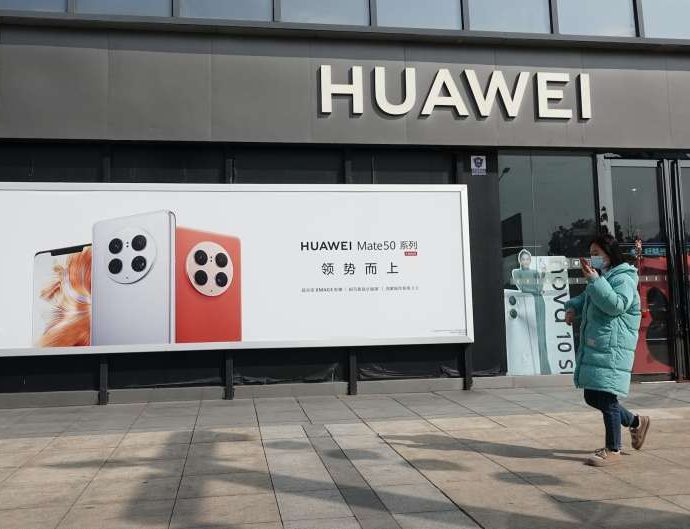Six Rohingya children flee Phatthalung shelter
Group had been caught for illegal entry just hours earlier
PUBLISHED : 22 Jul 2023 at 15:08
UPDATED : 22 Jul 2023 at 15:38

PHATTHALUNG: Six Royingya children escaped from a government-operated shelter in Muang district of this southern province on Friday night.
Police and officials from the Phatthalung Shelter for Children and Families began the search after being alerted by shelter staff at around 9pm, said Pol Lt Col Sombat Muksikim, chief inspector at the Cha-ngai police station in Muang district.
The six children — all reportedly aged between 9 and 12 years — had been picked up in Phatthalung earlier in the day for illegal entry into the country. Immigration police had taken them to the shelter, operated by the Ministry of Social Development and Human Security, for temporary detention pending an investigation.
No other information was available about the youngsters, how they got to Phatthalung or where the other members of their families might be.
The children reportedly made their escape after having dinner. They used a chair to climb over the wall at the back of the shelter to flee to a rubber plantation nearby. A bag and sandals were found at the plantation and their other belongings were left behind at the shelter.
The search team looked for them on foot for more than two hours and failed to find them, said Pol Lt Col Sombat.
Police are working with local leaders and residents to help provide clues if they come across the escapees.
Many Rohingya Muslims make the journey from Myanmar or from refugee camps in Bangladesh, travelling via southern Thailand to seek jobs in Malaysia. Most have to pay job brokers and human traffickers, and cases of groups being abandoned before reaching their final destination are not uncommon.
Malaysia halts Good Vibes music festival after same-sex kiss by UK band The 1975

KUALA LUMPUR: Malaysia’s government halted a music festival in the capital Kuala Lumpur on Saturday (Jul 22), a day after the frontman of British pop rock band The 1975 kissed a male bandmate onstage and criticised the country’s anti-LGBT laws.
“There will be no compromise against any party that challenges, disparages and violates Malaysian laws,” Communications Minister Fahmi Fadzil said in a Twitter post after meeting with the organisers of the Good Vibes Festival, a three-day event set to run until Sunday.
The 1975 has also been banned from performing in Malaysia, said a government committee that oversees filming and performances by foreigners.
Homosexuality is a crime in Muslim-majority Malaysia. Rights groups have warned of growing intolerance against the country’s lesbian, gay, bisexual and transgender people.
In videos posted on social media on Friday night, Healy was seen kissing bassist Ross MacDonald after criticising the Malaysian government’s stance against homosexuality in a profanity-laden speech to the festival audience.
He said the band had considered pulling out of the show but did not want to disappoint their fans in Malaysia.
“I made a mistake. When we were booking shows, I wasn’t looking into it,” he said. “I don’t see the f****** point … of inviting The 1975 to a country and then telling us who we can have sex with.”
Healy later cut short the set, telling the crowd: “All right, we gotta go. We just got banned from Kuala Lumpur, I’ll see you later.”
The band could not immediately be reached for comment. Healy was criticised for kissing a male fan at a 2019 concert in the United Arab Emirates, which also has laws against homosexual acts, according to media reports.
In a statement, Good Vibes organisers said the band’s set was stopped due to “non-compliance with local performance guidelines”.
Rock band The 1975’s set stopped in Malaysia after onstage kiss at Good Vibes music festival

KUALA LUMPUR: The British pop rock band The 1975 had its set at a Malaysian music festival cut short on Friday (Jul 21) night after frontman Matty Healy kissed a male bandmate onstage and criticised the country’s anti-LGBT laws.
Homosexuality is a crime in Muslim-majority Malaysia. Rights groups have warned of growing intolerance against the country’s lesbian, gay, bisexual and transgender people.
In videos posted on social media, Healy was seen kissing bassist Ross MacDonald after giving a profanity-laden speech to the audience at the Kuala Lumpur music festival Good Vibes, in which he criticised the Malaysian government’s stance against homosexuality.
He said the band had considered pulling out of the show but did not want to disappoint their fans in Malaysia.
“I made a mistake. When we were booking shows, I wasn’t looking into it,” he said. “I don’t see the f****** point … of inviting The 1975 to a country and then telling us who we can have sex with.”
Healy later cut short the set, telling the crowd: “All right, we gotta go. We just got banned from Kuala Lumpur, I’ll see you later.”
The band could not immediately be reached for comment. Healy was criticised for kissing a male fan at a 2019 concert in the United Arab Emirates, which also has laws against homosexual acts, according to media reports.
In a statement, Good Vibes organisers said the band’s set was stopped due to “non-compliance with local performance guidelines”.
Malaysia’s communications minister, Fahmi Fadzil, called the band’s performance “very disrespectful” in a Twitter posting, saying he would engage local authorities and summon the festival’s organisers for an explanation.
Hong Kong tightens radiation inspection of Japanese seafood imports: Report
TOKYO: Hong Kong has started strengthening radiation inspection of seafood imports from Japan, Kyodo news agency reported on Saturday (Jul 22). The tighter inspections started in mid-June and customs clearance of Japanese seafood was delayed by about three hours compared to the normal situation, the report said. Hong Kong onContinue Reading
Flooding hits Bangkok after hours of heavy rain
PUBLISHED : 22 Jul 2023 at 12:46
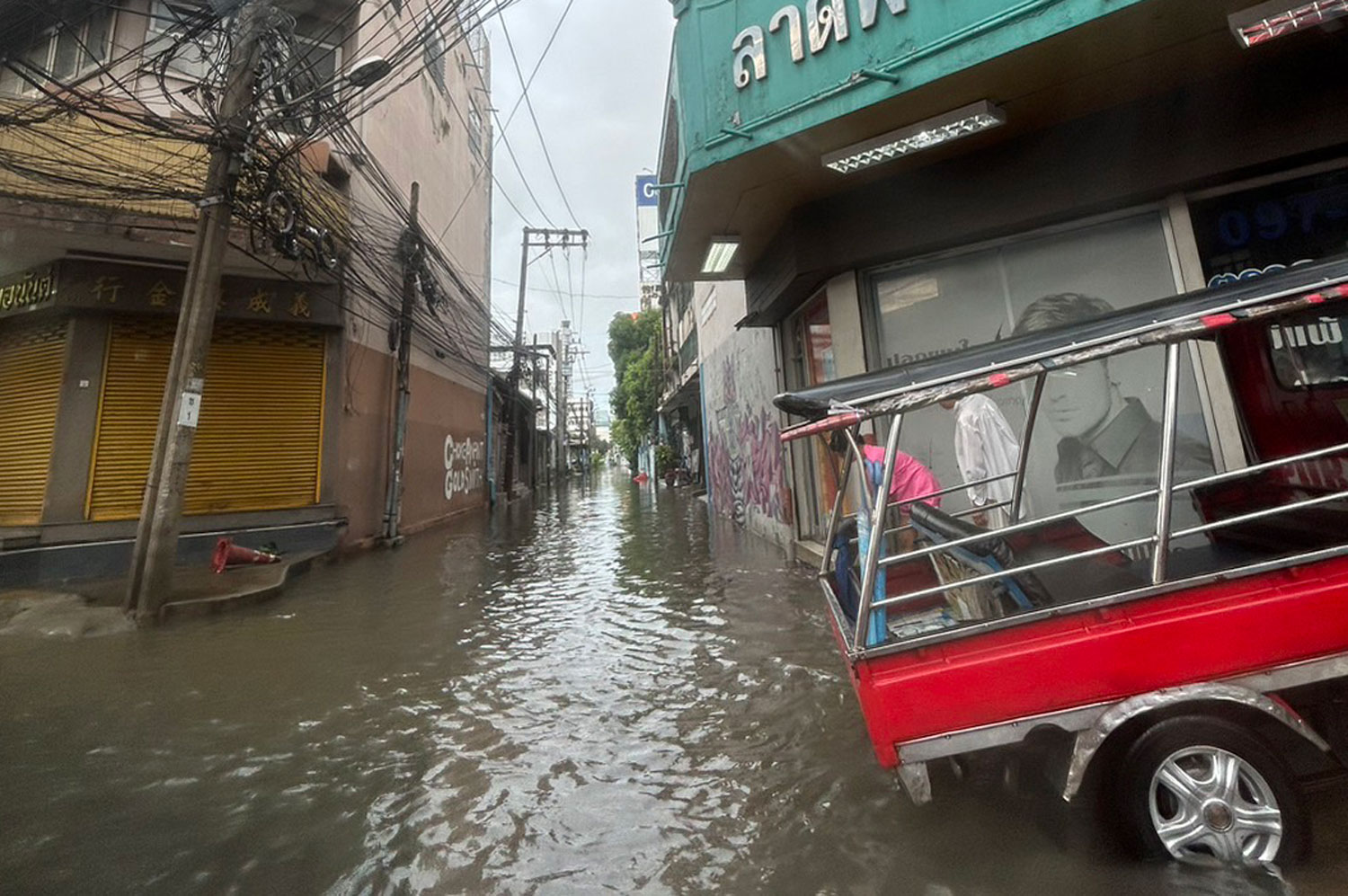
Floods have affected several locations in Bangkok on Saturday morning following hours of heavy rain overnight. Ratchadaphisek Road was worst hit.
Heavy downpours pounded several areas in Bangkok at around 9pm on Friday and continued to almost 2am, flooding roads in those areas.
On Saturday morning, some roads remained flooded and were awaiting to be drained.
In Chatuchak district, flooding hit several locations from Phaholyothin Road in front of Major Ratchayothin shopping mall to Lat Phrao intersection and Vibhavadi Rangsit Road, with floodwater rising to about 20 centimetres.
People enjoying meals and drinks at restaurants on Friday night found it difficult to return to their accommodation. Motorcycle riders had to park their vehicles under overpasses as riding amidst heavy rain would be at risk of road accidents.
Ratchadaphisek Road was worst hit as floodwater rose to almost 50cm. Some cars, small vehicles and motorcycles stalled as their engines were flooded.
Rescue workers were busy helping flood-affected people throughout the night.
Abeâs legacy lives on in Japanâs foreign and security policies

On July 8, 2023, marked the first anniversary of the assassination of former Japanese prime minister Shinzo Abe. Since then, Japanese foreign policy, with the exception of its policy toward Russia, has continued on the trajectory set by the country’s longest-serving prime minister.
While Abe doggedly pursued rapprochement with Russian President Vladimir Putin in hope of resolving the lingering dispute over the Kuril Islands, known as the Northern Territories in Japan, Russia’s invasion of Ukraine in 2022 forced less conciliatory Japanese policy.
Staying uninvolved no longer possible
In his keynote address at the IISS Shangri-La Dialogue in June 2022, Abe’s foreign minister and current Prime Minister Fumio Kishida reflected on the changed geopolitical reality: “In light of Russia’s aggression against Ukraine, countries’ perceptions on security have drastically changed around the world…. I myself have a strong sense of urgency that Ukraine today may be East Asia tomorrow.”
Also in 2022, Kishida became the first Japanese prime minister in history to attend a NATO summit, together with the Asia-Pacific partners known as the AP4. In Madrid, Kishida stressed that the security of Europe and that of the Indo-Pacific region could not be discussed separately.
This has since been repeated by Kishida and Foreign Minister Yoshimasa Hayashi at numerous summits.
Reflecting on a changed world
Japan is facing a challenging security environment with China, North Korea and Russia in its immediate neighborhood. In December 2012, Shinzo Abe published the essay “Asia’s Democratic Security Diamond,” where he warned about China’s aspirations in the South China Sea and expressed a need for a revival of the Quadrilateral Security Dialogue.
Abe’s administration formulated the first Japanese National Security Strategy (NSS) and established the National Security Council in 2013. The next step was the reinterpretation of the Japanese constitution and the introduction of national-security legislation in 2015, which allowed limited participation in collective security endeavors.
At that time, it was met by an opposition in the parliament and massive demonstrations. In hindsight, it was the foresight of Abe’s cabinet that sacrificed short-term popularity in abandoning the Yoshida Doctrine for long-term security goals.
Abe’s successor, Kishida, updated the Japanese NSS in December, along with two related documents. Originally, the government planned to update the NSS in 2020; however, because of Abe’s resignation as PM and the short-lived administration of Yoshihide Suga, the task fell to Kishida’s cabinet.
The new NSS including its goal to double military expenditure reflects on the new Japanese security reality: North Korea’s technological progress toward weapons of mass destruction, the unprecedented rise of China, and Russian aggression against Ukraine.
Under Kishida, Japan has become the most vocal supporter of Ukraine in the Indo-Pacific region. Japan, however, doesn’t stop with words. Following the example of other leaders in the Group of Seven, Kishida visited Ukraine’s war-torn capital, and Japan has provided unprecedented humanitarian assistance, loans and, because of its constitutional restrictions, non-lethal military equipment.
Abe had an eye for surrounding himself with talented policymakers. One of these prodigies, the current national security adviser, Takeo Akiba, formulated the Free and Open Indo-Pacific Strategy (FOIP) in 2016.
On the one hand, then-US president Donald Trump withdrew from the Trans-Pacific Partnership (TPP) in 2017, and it was up to mainly Abe and Australia’s prime minister at the time, Malcolm Turnbull, to save it. On the other hand, Abe found in Trump an unlikely ally for the Quad revival and for his FOIP vision. In 2018, the US even renamed its Pacific Command as the US Indo-Pacific Command.
Despite his differences with Trump, US President Joe Biden’s administration has largely continued his predecessor’s policies on the Indo-Pacific region and the Quad, but with some differences in tone and emphasis.
The Biden administration has reaffirmed its commitment to a “free and open Indo-Pacific,” and has elevated the Quad to a leader-level summit, where the four countries agreed to cooperate on issues such as Covid-19, climate change, technology and infrastructure.
The Biden administration has also sought to engage more multilaterally with its allies and partners in the region, such as through ASEAN-led mechanisms, the G7, and the North Atlantic Treaty Organization.
Kishida inherited FOIP, and this March, he symbolically announced his new plan for FOIP in India, where Abe gave his famous 2007 speech “Confluence of the Two Seas” in the Indian Parliament, presenting the Indo-Pacific region as one geo-strategic theater for the first time.
Much like the FOIP strategy, the Quad is also an idea that Kishida inherited. Following in Abe’s footsteps, Kishida has improved cooperation pursuant to the Japan-US alliance.
Abe cultivated long-term Japanese relations with Australia and India and established strategic partnerships with India in 2006 and with Australia in 2014. Kishida’s administration deepened security cooperation with Australia and the UK further, and signed the Reciprocal Access Agreements.
Japan plans to develop a sixth-generation fighter jet with the UK and Italy. Japan has also supported entry of the UK to the Comprehensive and Progressive Agreement for Trans-Pacific Partnership (CPTPP), the TPP’s successor.
The UK officially applied for CPTPP membership on February 21, 2021. Accession negotiations were concluded on March 31 this year and the UK formally signed the agreement as first European country to join the pact on July 16.
Japan is also strengthening security cooperation with France and Germany.
There is also continuity from Abe to Kishida in enhancing cooperation with the European Union and NATO. The Covid-19 pandemic was a further game changer. Learning from the pandemic, Kishida’s government made economic security its priority. This emphasis is visible not only in cooperation with Quad but also with the EU, ASEAN, and other partners.
Closer NATO ties
Prior the Vilnius summit, Secretary General Jens Stoltenberg welcomed in April Japan’s plan to open a diplomatic mission to NATO in Brussels. Prime Minister Kishida and his AP4 colleagues attended the second NATO summit in a row in Vilnius.
After adoption of the NSS, NATO accelerated negotiations with Japan on the Individually Tailored Partnership Program, which was signed at the Vilnius NATO summit for the period 2023-2026, increasing the areas of cooperation from nine to 16, reflecting the new security challenges.
Through the agreement with NATO, Japan hopes to strengthen its military capabilities in order to keep China at bay by expanding cooperation in areas such as cyber-defense and anti-disinformation measures.
For both NATO and Japan, an increased Russo-Chinese strategic alignment is a challenge. Deterrence has become the buzzword of the Kishida administration. China is Japan’s largest trading partner; therefore, even the theoretical possibility of a kinetic confrontation between the US and China, which would take place in its vicinity, creates a headache for Tokyo.
The only negative point before the Vilnius summit was when French President Emmanuel Macron voiced his opposition to the establishment of a NATO liaison office in Tokyo. For the time being, the proposal is likely to be shelved.
Japan, EU strengthen partnership
In recent years, the EU and a number of individual European nations have released new Indo-Pacific strategies or policies, reflecting increased worries about the influence of the region’s security environment on European economic and security interests. In sum, the Europeans have been involved in Indo-Pacific security issues not because they want to but because they see the need to do so.
European participation in the region has been primarily cautious and reactive. However, the growing connection between Europe and Asia has altered the backdrop, and Europe must now be more active.
These changes were also reflected in the recent statement by European Commission President Ursula von der Leyen at a joint press conference with European Council President Charles Michel and Kishida following the EU-Japan Summit in Brussels, just a day (July 13) after the NATO summit in Vilnius.
“We know that Indo-Pacific security and European security are indivisible,” von der Leyen said at the news conference.
The EU-Japan summit 2023 joint statement reflects the need to improve economic resilience, strengthen trade and investment relations, and enhance cooperation in critical raw-material supply chains.
Both the EU and Japan see the need to de-risk their supply chains and make their economies less dependent on China. The EU and Japan also aim to establish a strategic dialogue at the foreign-ministerial level and develop a security partnership.
They agreed on the intensification of counter-piracy cooperation and joint work on energy and green transitions under the Green Alliance, which will be stepped up.
EU and Japanese leaders agreed on accelerating their cooperation on digital transformation after the first meeting of the Digital Partnership Council in Tokyo on July 3, and the signing of memoranda of cooperation on semiconductors and to support secure and resilient submarine-cable connectivity between the EU and Japan.
In addition, they agreed to operationalize their Partnership on Sustainable Connectivity and Quality Infrastructure by jointly identifying a first list of substantial connectivity projects. The leaders also welcomed the enhancement of air connectivity between the EU and Japan, which is building on the “EU-Japan Horizontal Agreement for Air Services” signed in February.
Conclusion
Shinzo Abe, the longest-serving prime minister of Japan, certainly left a mark on his country and its foreign and security policies, but also on the Indo-Pacific region, a term he coined.
Tokyo, under Abe’s leadership, adopted the more assertive concept of “Proactive Contribution to Peace” as the basic principle for Japan’s national-security strategy.
Abe, often described as hawkish, didn’t change Japan’s ongoing adherence to the policies that are a testament to the path it has taken as a peace-loving nation: maintaining an exclusively defense-oriented posture, not becoming a military power, and observing the Three Non-Nuclear Principles.
Japan addressed global challenges during his tenure in cooperation with the US and other partners in the Indo-Pacific region, in Europe, and elsewhere that share the universal values of freedom, democracy, respect for basic human rights, and the rule of law.
Scholars will scrutinize his legacy, considered controversial by some, in the years to come. One thing is for certain: Together with Junichiro Koizumi, Nobusuke Kishi, and Shigeru Yoshida, he will count among the most influential Japanese prime ministers in its modern history, setting a high standard of expectations at home and internationally for any successor to follow.
Putinâs Black Sea grain gambit is a win for Turkey

Russia’s recent decision to suspend participation in the Black Sea Grain Initiative, a UN-backed agreement that has allowed Ukraine to export food during the ongoing conflict, will have repercussions that go beyond threatening global food security.
It could also rewrite the region’s political map.
In the eyes of many Russian propagandists, the grain-deal reversal is payback for humiliation levied by Turkey on July 7, when President Recep Tayyip Erdogan repatriated five captured Ukrainian commanders.
The fighters had spent several months in a secure facility in Turkey after surrendering to Russian troops in the port city of Mariupol last year. The soldiers were part of the Azov Regiment, which Russia considers a terrorist organization and which has been accused of harboring neo-Nazi and white supremacist ideology.
From the Russian perspective, Erdogan’s decision to send the men home was a slap in the face. If Russia had extended its participation in the grain deal, which uses Turkey as a transit hub, Putin would have looked even weaker, the thinking goes.
Russia’s withdrawal from the deal doesn’t mean the Kremlin is ready to reimpose another full blockade of the Black Sea, as it did at the beginning of the war, or that it plans to jeopardize its relations with Ankara. However, there is no doubt that one of the major goals of Russia’s recent missile strikes on Ukrainian ports is to prevent, at least temporarily, the country from exporting its grains.
Despite having different views on the UN-supported initiative, Putin and Erdogan remain “friends,” according to the Turkish leader. Putin is expected to visit Turkey in August, and the grain initiative will be high on the agenda. Although Russia has shown its hand, Erdogan insists that Putin is interested in a continuation of the agreement.
What any new deal might look like remains unclear. Russian officials claim that Turkey will have to purchase Russian grain “at normal world prices.” Ankara, on the other hand, hopes to continue buying both Russian and Ukrainian grain at discounted prices.
And yet because Erdogan seems to have the upper hand, it’s conceivable that Putin will have to accept Turkish conditions. Failure to do so could be costly for Moscow.
For one, Ankara could in effect close the Bosporus and Dardanelles straits to the Russian navy and civilian ships headed to Syria, complicating Russia’s engagement in the Middle Eastern country.
Russian energy companies involved in multibillion-dollar projects in Turkey could also be squeezed. Rosatom, which is building a nuclear power plant in southern Turkey’s Mersin province, and Gazprom, which seeks to turn Turkey into a gas hub, would almost certainly pressure the Kremlin not to anger their Turkish counterparts.
Barring that, Turkish authorities could follow the West and impose sanctions on Russian oligarchs who have found safe haven in their country.
Turkey and Ukraine might even start implementing a grain deal without Russia’s participation, which would represent another humiliation for Moscow. Under this scenario, Ukraine could simply continue exporting its grains to Turkey, ignoring Russia’s threats.
Along these lines, Ukrainian President Volodymyr Zelensky recently called on Erdogan and UN Secretary General Antonio Guterres to support grain shipments without Russian involvement.
Kiev and Ankara understand that the Kremlin is unlikely to dare sinking Ukrainian or Turkish civilian ships, as such an action could lead to direct Turkish involvement in the Ukraine war. Thus Ukraine and Turkey could simply continue doing grain business as usual.
However, if Moscow decides to escalate, and really starts attacking ships going to or from Ukrainian ports, Kiev will almost certainly respond. As a last resort, Turkey could even start supplying Ukraine with weapons via the Black Sea route, which would represent another blow to Putin and his war effort.
To avoid any of these outcomes, the Kremlin may have no choice but to take Ankara’s steer. Its propaganda machine could always spin Moscow’s policy as another “goodwill gesture,” with the goal of helping poor countries in Africa.
Erdogan might even insist that Moscow continue sending free grain to nations such as Mali, Djibouti, Sudan and Somalia – places where Turkey has been trying to increase its influence.
The fact that Turkey’s combat-drone producer Baykar has begun building a plant in Ukraine clearly indicates that Erdogan feels self-confident and doesn’t see Russia as a threat to Turkish interests. He knows that if Turkey is at the table, Putin’s room for political (and even military) maneuvering is limited.
For now, Turkey is in the driver’s seat. Erdogan won’t hesitate to push Putin to reach a new grain deal that saves Ankara money, and keeps the world fed. Moscow’s move might appear strategic, but in reality, it’s a desperate ploy by a leader quickly running out of options.
This article was provided by Syndication Bureau, which holds copyright.
Follow this writer on Twitter @nikola_mikovic.
Fateful demise of the Taiwan-China â92 Consensus
The major political parties in Taiwan have now selected their presidential candidates, kicking off the campaign season that will culminate in combined presidential and legislative elections on January 13, 2024.
For cross-Strait relations, this election may be the most significant in history. China is becoming militarily capable of attempting a forcible annexation of Taiwan, and Beijing seems convinced that the United States is pushing Taiwan toward permanent independence.
The Chinese government has committed itself to going to war if necessary to prevent the permanent political separation of Taiwan from China.
Taiwan’s presidential candidates are struggling to articulate a basis for reducing tensions with China. The “’92 Consensus,” which once seemed to offer hope for a stable cross-Strait peace, is still part of the political discussion in Taiwan.
Democratic Progressive Party (DPP) candidate Lai Ching-te, currently Taiwan’s vice president, rejects it, saying it implies that Beijing has sovereignty over Taiwan.

[embedded content]
Kuomintang (KMT) candidate Hou You-yi, however, embraces it. So does billionaire and Foxconn founder Guo Tai-ming (Terry Gou), who is positioning himself to enter the race.
Taiwan People’s Party candidate Ko Wen-je says maybe: He pledges that, if elected, he will ask Beijing to clarify the Chinese interpretation of the ’92 Consensus.
This discussion is tragically futile. The ’92 Consensus is long dead, and its demise exemplifies the difficulty of achieving a cross-Strait rapprochement.
Three distinct communities – “red,” “blue” and “green” – live alongside the Taiwan Strait, each with a different view of the Taiwan-China relationship.
The red is the population of mainland China, which believes Taiwan is inherently a province of China, and therefore should be subject to rule by the Chinese Communist Party (CCP) government in Beijing. For mainlanders, Taiwan’s de facto independence from China is illegitimate and must not become de jure and permanent.
The blue community, mainly comprised of recent immigrants from mainland China (including families descended from the two million KMT government supporters who fled to Taiwan in 1949), believes Taiwan is part of China but not of the People’s Republic of China (PRC).
They reject CCP rule, but would support unification if a non-communist, liberal democratic government controlled mainland China. Taiwan’s non-Chinese indigenous population tends to align politically with the blue community.
The green community, mainly the descendants of ethnic Chinese who immigrated to Taiwan before the Second World War, has developed a distinct national identity as “Taiwanese” rather than “Chinese.”
Members consider Taiwan a separate country from China, unable to enjoy international recognition of its rightful statehood solely because of China’s opposition.
The challenge for leaders on both sides of the Strait has been finding a description of the Taiwan-China relationship acceptable to all three communities. In truth, the task is impossible.
The bottom line for the red and blue communities is that Taiwan must acknowledge it is part of China. The green community’s bottom line is the exact opposite: it cannot abide any formulation that implies Taiwan is part of China.
The ’92 Consensus reputedly achieved a clever compromise. According to an August 1, 1992 statement by Taiwan’s Mainland Affairs Council, “Both sides of the Taiwan Strait agree that there is only one China” but they “have different opinions as to the meaning of ‘One China’.” For Beijing, “China” means the PRC; for Taiwan “China” means the Republic of China (ROC).
The statement adds that both mainland China and Taiwan are parts of “China.” For the price of agreeing to China’s position that Taiwan is part of “one China,” Taipei seemingly got Beijing to accept that “China” could mean the ROC instead of the PRC.
The DPP argues, however, that the ’92 Consensus is fake because there never was a consensus. That argument has considerable merit. There is little if any evidence that the PRC ever acknowledged the part of the agreement that allows for different interpretations of “China.”
A US official reported that then-PRC leader Hu Jintao said during a March 26, 2008, telephone conversation with US President George W Bush that “the Chinese mainland and Taiwan should restore consultation and talks on the basis of ‘the 1992 consensus,’ which says both sides recognize there is only one China but agree to differ on its definitions.”

Two caveats about this report. First, KMT candidate Ma Ying-jeou had just been elected as Taiwan’s new president to succeed DPP member Chen Shui-bian, good news from China’s point of view, which may have moved Hu to speak with unusual generosity.
Second, when he said the ’92 Consensus allows for differing definitions of China, it’s unclear if the US official was quoting Hu or relating his own understanding of the ’92 Consensus.
Moreover, the term “’92 Consensus” had not emerged before 2000. Outgoing National Security Council Secretary General Su Chi said he invented the term in reaction to the election of Chen as Taiwan’s president.
Su said the shorthand was preferable “because China didn’t like the ‘each side with its own interpretation’ part and the DPP government didn’t like the part that said ‘one China.’”
Beijing eventually accepted and even celebrated the term. It now calls the ’92 Consensus “the cornerstone of cross-Taiwan Strait relations.”
The DPP is right to point out that the ’92 Consensus does not mean what some KMT politicians think it means. On the other hand, the DPP incorrectly argues that China considers the ’92 Consensus another term for the thoroughly discredited “one country, two systems” idea.
Beijing endorses both the ’92 Consensus and one country, two systems but doesn’t consider them the same thing. Nevertheless, this defamation probably helped current ROC President Tsai Ing-wen win a second presidential term over KMT challenger Han Guo-yu in 2020.
Even if Beijing had accepted both parts of the KMT’s rendering of the ’92 Consensus, the notion suffers from a more serious flaw: It represents the sentiments of only two of the three Taiwan Strait communities. Thus it was seemingly successful only while the KMT controlled the ROC government.
In any case, Xi Jinping has killed off any basis for harboring even a residual illusion of a ’92 Consensus. In his 2019 speech to “compatriots in Taiwan,” Xi said the content of the ’92 Consensus is that “both sides of the Taiwan Straits belong to one China and will work together toward national reunification.”
He mentioned nothing about different interpretations of what “China” means.

A 2022 editorial in a CCP-run newspaper said it even more bluntly: “In the ‘1992 Consensus’ there is only ‘One China’ – there are no ‘different interpretations.’”
In reinterpreting the “consensus,” Xi undercut the politicians in Taiwan who agree with the PRC that Taiwan is part of China. Both current KMT Chairman Eric Chu and his predecessor Johnny Chiang tried to move on from the ’92 Consensus, but party elders such as Ma insisted on clinging to it.
Left hanging by Xi, Ma himself said Xi’s interpretation of the ’92 Consensus is different from the KMT’s interpretation – which would seem to be an admission there is no consensus.
The saga of the hollow consensus illustrates why the Taiwan Strait conflict is a wicked problem. Taiwanese nationalism is as immovable an object as is China’s insistence that Taiwan is part of China. Beijing continues to insist on a precondition that the green community cannot accept.
Recent history shows that refusing to deal with DPP governments while hoping for the KMT to return to power is not a viable strategy for China. The DPP has held the presidency since 2016, and DPP candidate Lai is currently the frontrunner for the 2024 election.
But even when Taiwan had a KMT government willing to accept the One China principle, Beijing was unwilling to relax even slightly its position that “China” can only mean the PRC. Instead, the Chinese government has deviously adopted Su’s term while neutering its content.
If Beijing would not compromise in 1992, it is less likely to compromise today, when it perceives a crisis over Taiwan independence and Xi is preparing China for war.
Denny Roy is a senior fellow a the East-West Center, Honolulu.
Mongolia-SpaceX deal provokes a security stir in China
Mongolia’s recent decision to adopt SpaceX’s Starlink internet services is stirring security concerns across the border in China, both as a potential military threat and a possible way around Beijing’s strict censorship regime on perceived as “harmful” foreign websites.
On July 6, the Communications Regulatory Commission of Mongolia issued special licenses for SpaceX, founded by American billionaire tycoon Elon Musk, to operate as a service provider using low-orbit satellites and for Starlink to provide internet services in the country.
The decision, part of the country’s ongoing digital transformation and New Recovery Policy, was announced ahead of the annual Mongolia Economic Forum 2023 held on July 9-10.
“A network of fiber optic cables already provides wide-reaching access to high-speed internet across Mongolia,” Minister for Digital Development and Communications Uchral Nyam-Osor said on July 7.
“But Starlink’s technology will provide greater access to hard-to-reach areas of the country. Herders, farmers, businesses and miners living and working across our vast country will be able to access and use information from all over the world to improve their lives,” the minister said.
However, some Chinese pundits have a different view of the satellite deal.
“Mongolia is our neighbor. The satellite cannot provide its services to one area and sharply draw a line and stop providing them in another area,” Chen Jiesen, a Shanghai-based commentator, says in his vlog. “The network capacity can easily spill over to nearby places. Will it break our Great Firewall?”
Chen says even if Starlink promises not to cross the line, it has already planned to provide services in Mongolia and Pakistan, neighbors of China’s Inner Mongolia and Xinjiang regions, respectively. He writes if destabilizing social events happen in either neighbor, the related news may influence people in China through Starlink’s services.
He also says that, with Starlink’s autonomous services, countries that use its services cannot opt to shut down internet services in such situations.
Some Chinese commentators have said that Starlink’s dual-use satellites could pose a threat to China’s information and national security, especially during wartime.

SpaceX did not immediately reply to Asia Times’ request for comment.
A spokesperson of the Mongolian Ministry of Digital Development and Communications asserted, however, that the use of Starlink’s services will not affect Mongolia’s relations with neighboring states.
“Cross-border communications infrastructure and connectivity are governed by international treaties that have been mutually agreed upon by all countries, including Mongolia and its neighboring states,” the spokesperson said. “These treaties serve as a foundation for fostering cooperation and understanding among the nations involved.”
He said Mongolia maintains friendly bilateral relations with its neighbors and holds the utmost respect for the sovereignty of all nations.
“As for China, it has established its own regulations and monitoring mechanisms concerning such technologies,” he said. “Consumers in China will be governed by their own jurisdiction in accordance with their country’s laws and regulations.”
He said the Mongolian government has openly extended an invitation to all low-orbit connectivity providers to explore market opportunities within the country and Starlink was chosen as it was the first to enter the market.
Beijing’s warning
As of May this year, Starlink had built a fast-growing network of more than 4,000 satellites in low-Earth orbit (LEO). The company has plans to boost that number to 42,000 by mid-2027.
Its services have so far been adopted by at least 32 countries with holdouts including China, Russia, Iran, North Korea and Iran, according to a company map.

In May last year, the People’s Liberation Army Daily, a Chinese military-run newspaper, published an article entitled, “Beware of Starlink’s barbaric expansion and military applications.”
“Although Starlink says it provides high-speed internet services for civil use, it has a deep background related to the US military,” the article said. “One of its launch centers is located inside the US Vandenberg Air Force Base and it tested a secure connection between its satellites and the US Air Force’s fighter jets.”
The article said Starlink’s satellites can boost the US military’s combat power, including through satellite-enabled remote sensing, communication, navigation and positioning capabilities.
Last October, Musk told a Financial Times editor that Beijing had sought assurances that he would not sell Starlink in China.
“Starlink is the backbone of the Ukrainian army’s command and control system on the Ukrainian battlefield, and China also needs to have this capability,” a Jiangxi-based military writer says. The safety factor and communication capabilities that come with having tens of thousands of Starlink satellites are far superior to relying on a few large satellites, he says.
The writer stresses that, as high-speed data transmission is essential in wartime, China’s demand for communication satellites will continue to increase. He says China has built a 5G network locally and will develop a low-orbit satellite network to serve Belt and Road countries.
On July 9, China successfully launched its first low-orbit satellite that can provide internet services, Xinhua reported.
Mongolia’s ‘crazy idea’
Apart from Starlink, Mongolia is seeking to form a partnership with Musk’s Tesla, the world’s largest electric vehicle (EV) manufacturer.
On June 7, Mongolian Prime Minister Oyun-Erdene Luvsannamsrai asked Musk in a virtual meeting to start research on the use of Mongolia’s copper and rare earth elements to make Teslas in the country. He said that, although this idea may sound crazy for the moment, it could work.
He also suggested the establishment of a scholarship program to train Mongolia’s information technology (IT) engineers.
The Mongolian government said Starlink’s introduction is the first stage of its ambitious and wide-ranging program to develop a space economy. It said it is strengthening partnerships with G7 countries to explore space-related cooperation opportunities for peaceful purposes, including on communication satellites.
Mongolian Parliament Speaker Gombojavyn Zandanshatar told Asia Times in an interivew that during this year’s Mongolia Economic Forum the government also entered into a partnership with the London-based What3Words, which operates a geocode system that can help streamline postal services and highlight tourism spots.

To attract more foreign investment, the government will also set up a private partnership center and an investment and trade agency, Zandanshatars said, adding that Parliament is committed to revising the Draft Law on Investment.
“China is a particularly important trading partner for Mongolia, representing 82% of our exports in 2021,” he said. “Further investment in this partnership from our side will ensure the success of our long-term development policies.”
He stressed that Mongolia will continue to create an environment that welcomes responsible foreign investors in all sectors and ensures that they are given the same level of treatment as local businesses.
Read: Interview: Mongolian ministers have a revival plan
Read: Interview: Mongolia vows to break its corruption habit
Follow Jeff Pao on Twitter at @jeffpao3
Parsing Chinaâs counter to US sanctions
After a recent meeting between US Treasury Secretary Janet Yellen and officials in Beijing, China released a statement demanding “practical action” over the issue of sanctions. The implication was that the punitive measures – imposed by the US government on hundreds of Chinese individuals and entities over the past few years – impede any alleviation of the strained relations between the two economic giants.
The statement followed a testy encounter in May 2023 in which Chinese Defense Minister Li Shangfu refused to meet his American counterpart because of sanctions. Clearly, the economic measures are hurting China – prompting not only tough words but also countermeasures to limit their impact.
As a professor of law and an expert on international trade, I study both how the US sanctions China and how China attempts to counter these sanctions. I also analyze whether China’s countermeasures are working.
How sanctions work
Economic sanctions are considered an important foreign policy tool that can be used to influence and change the behavior of countries.
The sanctions on China have been imposed for a myriad of reasons, including as punishment for human rights abuses, espionage activities and supporting Russia’s war efforts in Ukraine. Some sanctions are intended to restrict China’s technological capabilities by limiting access to key tech suppliers.
To be successful, the sanctioning country must have the economic clout to inflict economic damage on the other country and thus force change.
In the case of China, sanctions have harmed producers and consumers in both countries. They have also benefited certain third countries – for example, through trade diversion that replaces Chinese exporters with suppliers from other countries.
Traditionally, sanctions have targeted entire countries. For example, since February 2022 the US has imposed sweeping sanctions against Russia for its invasion of Ukraine. In addition, the US has imposed multiple sanctions against Cuba over the past 65 years in a failed attempt to force regime change.
Economic sanctions can be primary or secondary. With primary sanctions, the US, for example, forbids imports of any product from the country being sanctioned. Primary sanctions also bar all U.S. companies from doing any business with the country or entities within it.
In secondary sanctions, the US refuses to engage in business with any company that has a business relationship with the country being sanctioned. In its most extreme form, these sanctions also prohibit conducting business with a company that has a relationship with another company that in turn has a relationship with the sanctioned country.
Targeting individuals and businesses
In recent years, US sanctions against China have become more targeted against specific individuals, products and companies.
For example, the Office of Foreign Assets Control of the Treasury Department publishes a list of Specially Designated Nationals against which sanctions apply. Individuals and businesses on the list have their assets blocked, and US citizens are prohibited from dealing with them.
There are hundreds of Chinese individuals and businesses on the list, including officials in China’s Hong Kong liaison office and major corporations such as China National Electronic Import-Export Company.
Also, the US Commerce Department, through its Bureau of Industry, implemented export controls in October 2022 on certain exports to China, such as advanced computing equipment and semiconductor parts. These export controls were put in place because of concerns over China’s defense modernization.
In response to the secondary sanctions and the complex enforcement and compliance issues they create for governments and businesses alike, the European Union and countries including Canada and the UK have enacted what are called blocking statutes.
Blocking statutes typically allow an individual or business to not comply with US laws and require individuals and businesses to notify authorities about any US sanction enforcement measures.

China’s countermeasures
The Chinese government has taken several countermeasures to retaliate against US sanctions in recent years.
In 2020, the Ministry of Commerce in China issued the Unreliable Entity List. A person or company is designated as “unreliable” if Chinese authorities deem them to be harming national security or development interests of China or applying discriminatory measures against a Chinese entity.
Punitive measures – such as trade and investment restrictions and fines – may be imposed on them for conduct that is contrary to China’s national interests. So far, two US aerospace and defense companies have been listed as unreliable entities.
In addition, in 2021 the Chinese Ministry of Commerce issued the Rules on Counteracting Unjustified Extraterritorial Application of Foreign Legislation and Other Measures.
A Chinese blocking statute, the rules require any Chinese citizen, business or other organization that is restricted or prohibited by US sanctions from engaging in normal economic activities with a third nonsanctioning country to report such matters to the Chinese authorities.
China also enacted the Anti-Foreign Sanctions Law in 2021. This law authorizes China to take action – such as restrictions on visas and who can enter or exit the country – when a foreign country adopts what China sees as discriminatory measures against any Chinese citizen or organization.
In addition, censured individuals or businesses can be slapped with a freezing of assets and prevented from doing business in China. Also, a Chinese individual or business can bring a case before Chinese courts and ask for an injunction from or damages for having to comply with foreign sanctions.
Unfortunately, the effectiveness of these countermeasures is unclear. There are no available statistics to determine whether they have mitigated the impact of US sanctions.
Caught in the middle
The US and China are economic superpowers. Imposing sanctions and countersanctions can make it difficult for any foreign country or company that wants to do business in both countries. It is, in effect, asking them to pick sides.
Some individuals and companies within both China and the US may opt to adopt a pragmatic approach to the sanctions and continue to do business either directly or indirectly. But by doing so they risk being fined by US authorities.
Or, they may try to circumvent these sanctions and countersanctions by working with businesses in other countries instead, or find different ways to inoculate themselves from the effects of sanctions. Both the US and China are likely to not push sanctions too hard, so as not to engage in a full-blown trade war.
Workarounds for businesses that trade with both the US and China are critical when the sanctioning country – typically the US – has a monopoly over the particular goods or technology in question.
For example, there is no short-term fix for Chinese telecom giant Huawei when the US denies it access to critical semiconductors, since the US has a monopoly on semiconductors. Eventually, semiconductors will be produced in China, but not for several years. In the meantime, Huawei has seen a decline in revenue and shifted money toward more research and development.
The experience of Huawei underscores why Beijing is eager to find a way to counter US sanctions. It seems that at least for now China has settled on a policy of blocking tactics at home while upping rhetoric on the international stage.
Bashar Malkawi, Professor of Law, University of Arizona
This article is republished from The Conversation under a Creative Commons license. Read the original article.





